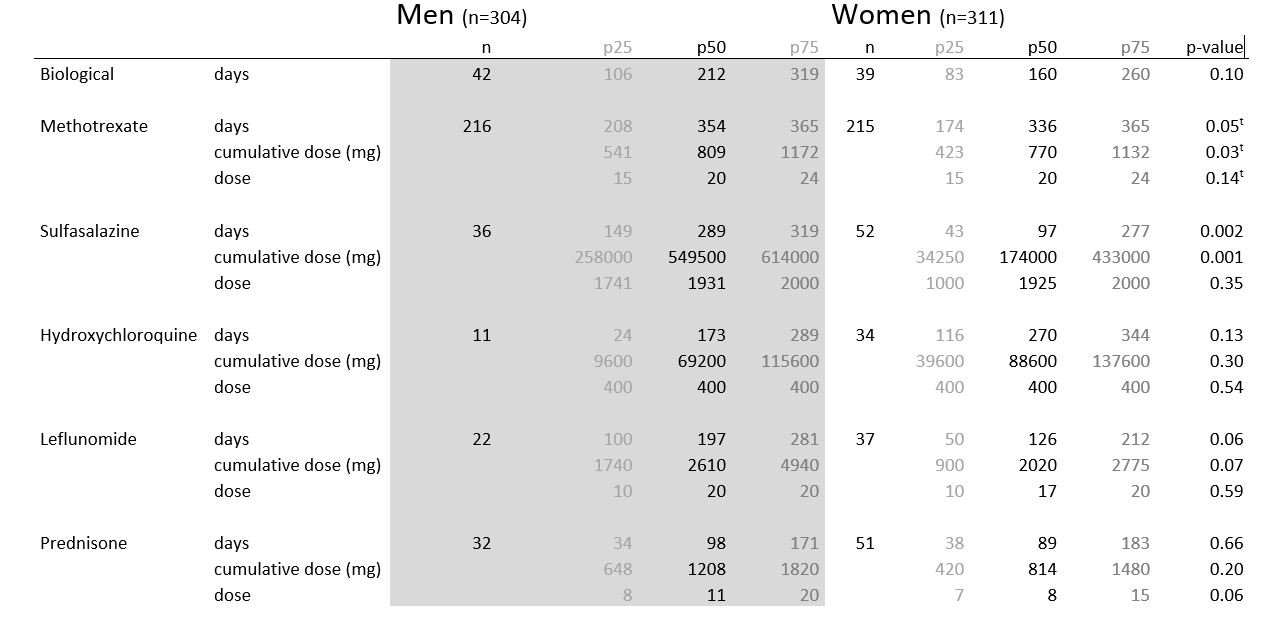Session Information
Date: Friday, November 6, 2020
Session Type: Poster Session A
Session Time: 9:00AM-11:00AM
Background/Purpose: According to existing knowledge, the prevalence of psoriatic arthritis (PsA) is equal in men and women, however, women experience a higher burden of disease (pain, disability and fatigue). Recently we showed that women with newly diagnosed PsA present higher disease activity, pain and functional impairment compared to men at baseline but also at one year of follow up. Several reasons could be incriminated for the observed differences and their persistence over time. One of them could be a different therapeutic approach, maybe less aggressive, in women compared to men.
To compare applied treatment in female and male patients with early PsA.
Methods: Data were used from the Dutch south west Psoriatic Arthritis Cohort (DEPAR) which includes newly diagnosed PsA patients. Data on disease activity, medication use and patient reported outcomes is gathered at baseline and from then, during the first year, every 3 months. Exposure time (days), cumulative and mean dose per dosing interval during the first year were calculated for each conventional DMARD (csDMARD). Exposure time for biological DMARDs (bDMARDs), as a group was also calculated. T-tests and Kruskal Wallis tests were used for the comparison across sexes. Stata 16 was used for statistical analysis.
Results: In February 2019, 615 patients were available for analysis, 304 men and 311 women (51%), average age of 50 (SD 13.6) years. Oligoarthritis was the most frequent phenotype (39%), more frequently present in men (44%) than in women (33%). Polyarthritis (23%) was more prevalent in women. 523 patients had 12 months of follow-up, while the remaining 92 participated a mean 223 days in the study. Over the first year, 75% of the patients received one or more DMARDs for which the majority (82%) started within the first month after diagnosis. Not using DMARDs was equally present in both sexes. Monoarthritis was the phenotype less frequently treated by DMARDs (50%).
Results are shown in table 1. Methotrexate was the most frequently used drug during the first year. Its frequency (70%) and dosing (median 20 mg/week) were similar for men and women.. Women received methotrexate for a shorter period (median 270 vs 290 days) and subsequently had a lower cumulative dose compared to men. Sulfasalazine, leflunomide, hydroxychloroquine and corticosteroids were more frequently prescribed in women compared to men. Retention time of sulfasalazine was substantial shorter in women. Number of days on bDMARDs was lower for women (n=39, median 160 days), but not significantly different from men(n=42, median 212 days), mainly caused by a later start of bDMARDs in women.
Conclusion: 75% of early Psoriatic Arthritis patients in DEPAR were treated by DMARDs in the first year after diagnosis. Initial treatment strategies were similar in both sexes. However, over time women received methotrexate for a shorter period, were more often switched to other csDMARDs and started later with bDMARDs. Retention time for the other csDMARDs was shorter in women. These observations raise the question whether optimal therapeutic strategies are in place for women with early PsA.
 Table 1 DMARD medication frequency, median days of exposure, cumulative dose and dose per dosing interval in the first year after PsA diagnosis stratified by sex. *non-parametric comparison between men and women. t parametric t-test for comparison between men and women
Table 1 DMARD medication frequency, median days of exposure, cumulative dose and dose per dosing interval in the first year after PsA diagnosis stratified by sex. *non-parametric comparison between men and women. t parametric t-test for comparison between men and women
To cite this abstract in AMA style:
Passia E, Luime J, Kok M, Tchetverikov I, Vis M, Fodili F, Ruiterman Y, Korswagen L. Is Sex-adjusted Treatment in Early-PsA Justified? [abstract]. Arthritis Rheumatol. 2020; 72 (suppl 10). https://acrabstracts.org/abstract/is-sex-adjusted-treatment-in-early-psa-justified/. Accessed .« Back to ACR Convergence 2020
ACR Meeting Abstracts - https://acrabstracts.org/abstract/is-sex-adjusted-treatment-in-early-psa-justified/
